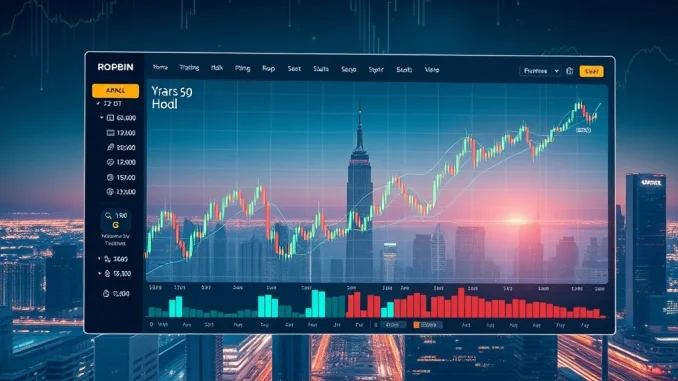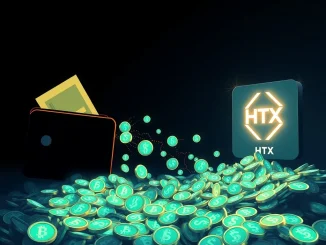
Robinhood, the trading platform synonymous with democratizing investment, is once again making headlines. This time, the buzz is all about Robinhood tokenized stock – a bold new venture that promises to shake up how we think about private company investments. Despite facing a wave of initial criticism, Robinhood’s CEO, Vlad Tenev, remains steadfast in his conviction that this innovative approach holds immense potential for the future of finance.
Robinhood Tokenized Stock: Navigating the Initial Controversy
It’s often said that being a pioneer comes with its share of challenges, and Robinhood’s foray into Robinhood tokenized stock is a prime example. Earlier this month, the platform began distributing tokens representing shares of private companies, including high-profile names like OpenAI. However, this move quickly drew controversy when OpenAI publicly stated that the offering had not been approved by them. This immediate backlash sparked debates across the financial and crypto communities regarding the legality, approval processes, and underlying mechanisms of such offerings.
In an interview, Vlad Tenev acknowledged this friction, stating, “every time you’re the first to do something interesting, it has some element of controversy.” This perspective highlights the inherent difficulties in innovating within highly regulated financial markets, especially when dealing with novel concepts like tokenized assets. The incident, while problematic, also thrust the concept of private company tokenization into the mainstream spotlight, forcing a conversation about its implications and potential.
Vlad Tenev’s Vision: Unlocking Access to Private Markets
Despite the initial hurdles, Vlad Tenev remains undeterred. His focus is firmly on the long-term potential of this new asset class. Robinhood’s ambitious plans include expanding its tokenized stock business to encompass thousands of private companies in the future. This vision is not just about offering a new product; it’s about fundamentally changing how retail investors can access lucrative private market opportunities that were traditionally reserved for institutional investors or the ultra-wealthy.
Tenev believes that tokenization can bring much-needed liquidity and accessibility to private markets, which are currently opaque and illiquid. By breaking down large investments into smaller, tradable tokens, Robinhood aims to democratize access, allowing everyday investors to participate in the growth stories of innovative private companies long before they might go public. This aligns perfectly with Robinhood’s historical mission to make investing accessible to everyone, regardless of their net worth.
Understanding Tokenized Assets: A Game-Changer?
So, what exactly are tokenized assets, and why are they creating such a stir? In essence, tokenized assets are digital representations of real-world assets stored on a blockchain. These assets can range from real estate and art to, in this case, shares of private companies. The process of tokenization transforms traditional ownership rights into a digital token, which can then be easily bought, sold, and transferred on a blockchain network.
Here’s why tokenized assets are considered a potential game-changer:
- Fractional Ownership: Unlike traditional shares that often require significant capital, tokenization allows assets to be divided into smaller, more affordable units. This means an investor could own a fraction of a private company’s share, making high-value investments accessible to a broader audience.
- Increased Liquidity: Private markets are notoriously illiquid. Tokenization, by facilitating easier transfer and trading on secondary markets, can significantly improve liquidity, allowing investors to enter and exit positions more readily.
- Enhanced Transparency: Blockchain’s immutable ledger provides a transparent record of ownership and transactions, reducing the need for intermediaries and potentially lowering costs.
- Global Accessibility: Digital tokens can be traded across borders 24/7, opening up private investment opportunities to a global investor base without the constraints of traditional banking hours or geographical barriers.
The Regulatory Landscape for Digital Securities
The path forward for digital securities is not without its challenges, particularly concerning regulation. The OpenAI incident underscored the complexities of operating in a space where existing financial regulations meet nascent blockchain technology. Regulators worldwide, including the SEC in the United States, are still grappling with how to classify and oversee these new forms of assets.
For tokenized stock to achieve widespread adoption and truly transform private markets, clear regulatory frameworks are essential. This involves defining what constitutes a security in the digital realm, establishing investor protection mechanisms, and ensuring compliance with anti-money laundering (AML) and know-your-customer (KYC) regulations. Robinhood, as a regulated entity, will need to work closely with authorities to ensure its offerings meet all legal requirements, building trust and stability in this evolving sector. The ongoing dialogue between innovators like Robinhood and regulators will shape the future trajectory of digital securities.
Robinhood’s Role in Shaping the Future of Finance
Robinhood’s aggressive push into tokenized stock is a clear signal of its intent to be a key player in the future of finance. By making private company investments more accessible, Robinhood could fundamentally alter capital formation and investment strategies. Imagine a world where promising startups can raise capital directly from a global pool of retail investors, bypassing traditional venture capital firms or lengthy IPO processes. This could foster greater innovation and economic growth.
However, this transformation won’t happen overnight. It requires overcoming technological hurdles, building robust infrastructure, and, most critically, gaining widespread investor trust. Robinhood’s journey with tokenized stock represents a significant step towards a more inclusive and liquid financial ecosystem. It forces us to reconsider traditional investment models and embrace the potential of blockchain technology to democratize wealth creation. The future of finance is being built brick by brick, or perhaps, token by token.
Benefits of Tokenized Stock
- Increased Accessibility: Opens up private investment opportunities to a broader range of investors, not just institutions.
- Fractional Ownership: Allows investors to own smaller, more affordable pieces of high-value assets.
- Enhanced Liquidity: Facilitates easier buying and selling of private company shares on secondary markets.
- Global Reach: Enables cross-border investments with fewer geographical barriers.
- Greater Transparency: Leverages blockchain’s immutable ledger for clear ownership records.
Challenges Ahead for Tokenized Assets
- Regulatory Uncertainty: Evolving and often unclear legal frameworks across different jurisdictions.
- Market Adoption: Need for widespread acceptance and understanding among investors and companies.
- Security Risks: Potential for smart contract vulnerabilities or cyberattacks, though blockchain itself is robust.
- Investor Education: The need to educate potential investors about the unique characteristics and risks of tokenized assets.
Conclusion: A Glimpse into Tomorrow’s Investments
Robinhood’s venture into tokenized stock, spearheaded by Vlad Tenev, is more than just a new product offering; it’s a bold statement about the direction of investment. While the path is undoubtedly fraught with regulatory challenges and public scrutiny, the underlying potential of tokenized assets to democratize access to private markets is undeniable. As the financial world continues to converge with blockchain technology, initiatives like Robinhood’s could pave the way for a truly inclusive and liquid investment landscape, reshaping the very future of finance as we know it. It’s an exciting, albeit controversial, journey towards a more accessible and efficient global market.
Frequently Asked Questions (FAQs)
Q1: What exactly is Robinhood tokenized stock?
A1: Robinhood tokenized stock refers to digital tokens offered by Robinhood that represent ownership in shares of private companies. These tokens are built on blockchain technology, aiming to provide a new way for investors to access private market investments.
Q2: Why is Robinhood pursuing tokenized assets despite criticism?
A2: Robinhood CEO Vlad Tenev believes that tokenized assets have significant potential to democratize access to private company investments, making them more liquid and accessible to a broader range of investors. He views the initial criticism as part of being a pioneer in a new, innovative space.
Q3: What was the controversy involving OpenAI and Robinhood’s tokenized stock?
A3: Earlier this month, Robinhood distributed tokens of private companies, including OpenAI. However, OpenAI publicly denied that this offering had been approved by them, leading to questions about the legitimacy and authorization of such token distributions.
Q4: What are the main benefits of investing in digital securities?
A4: The primary benefits of investing in digital securities include increased accessibility to traditionally exclusive private markets, the ability for fractional ownership, potentially enhanced liquidity, greater transparency through blockchain records, and global reach for trading.
Q5: What are the primary risks associated with tokenized stock?
A5: Key risks include regulatory uncertainty, as frameworks for digital securities are still evolving; potential for lower market adoption compared to traditional assets; and security concerns related to the underlying blockchain technology or smart contracts, though robust systems aim to mitigate these.
Q6: How might Robinhood’s push into tokenized stock impact the future of finance?
A6: Robinhood’s initiative could significantly impact the future of finance by democratizing private capital markets, potentially allowing thousands of private companies to raise capital from a wider investor base. This could lead to increased liquidity, innovation, and a more inclusive global investment landscape.



